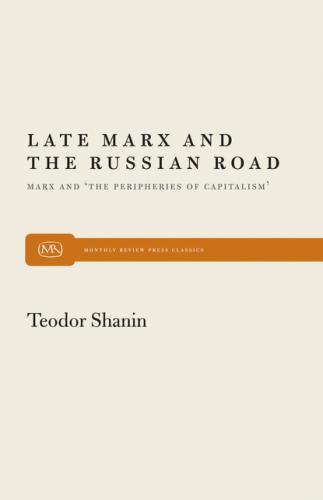Late Marx and the Russian Road
A case presented by
Teodor Shanin
(editor)
Late Marx and the Russian Road
Marx and ‘the peripheries of capitalism’
Monthly Review Press
New York
Copyright © 1983 by Teodor Shanin
All rights reserved
Library of Congress Cataloging in Publication Data
Main entry under title:
Late Marx and the Russian road.
Includes index.
1. Marx, Karl, 1818-1883. 2. Communism – Soviet Union – History. I. Shanin, Teodor.
HX39.5.L363 1984 335.42’3 83-13237
ISBN 0-85345-646-1
ISBN 0-85345-647-X (pbk.)
Manufactured in Great Britain
10 9 8 7 6 5 4 3 2 1
To Eric Hobsbawm
this book is gratefully offered
as a belated tuition fee
De omnibus dubitandum
Contents
Late Marx: gods and craftsmen Teodor Shanin
Marx and revolutionary Russia Haruki Wada
Late Marx: continuity, contradiction and learning Derek Sayer and Philip Corrigan
Marx-Zasulich correspondence: letters and drafts
Vera Zasulich: A letter to Marx (February 1881)
Karl Marx: Drafts of a reply (February/March 1881)
Karl Marx: The reply to Zasulich (March 1881)
David Ryazanov: The discovery of the drafts (1924)
Karl Marx: A letter to the Editorial Board of Otechestvennye Zapiski
Marx after Capital: a biographical note (1867-1883) Derek Sayer
The Russian scene: a biographical note Jonathan Sanders
Part III: The Russian Revolutionary Tradition 1850 to 1890
Nikolai Chernyshevskii: Selected writings
The People’s Will: Basic documents and writings
Marxism and the vernacular revolutionary traditions Teodor Shanin
Introduction
Books ideally speak for themselves. A lengthy explanation of contents may deflect attention from the book’s goal, especially so, in a volume which includes also papers of interpretation. This introduction will be brief.
The mid-part of the book is mainly given to the drafts of Marx’s 1881 discussion concerning rural Russia and some supplementary materials. The iconoclastic nature of this extraordinary piece of thinking aloud as against Marx’s earlier views and later interpretations, the peculiar history of those drafts, the relevance of them for the so-called ‘developing societies’ of today, make these papers into one of the most important intellectual ‘finds’ of the century. Their first full and direct translation into English should enable the readers to judge for themselves the extent to which Marx’s magnificent originality, foresight and heretical élan stayed with him to the very end. Bureaucrats and theologians of science in whichever camp will not like it. Good!
The book’s first part offers some interpretations of Marx’s work at the last stage of its development, relating directly to the drafts published. It is polemical and not of one cloth – in such matters critical doubt and debate are essential. It was Marx who chose as his favourite motto De omnibus dubitandum – ‘doubt everything’ – and the drafts below offer living proof of how much he was true to this principle. A way to honour his scholarship is to follow him in that.
The final part three of the book presents some materials which come to trace the intellectual bridges between Marx’s writings on Russia and the Russian revolutionary tradition. It begins with extracts from those writings of Chernyshevskii which influenced particularly and explicitly Marx’s own work. It then places before Western audiences, for once verbatim, the major programmatic and analytical statements of the People’s Will – the Russian indigenous revolutionary organisation of Marx’s own time, and a group to which Marx and Engels have consistently referred till the end as ‘our friends’. The whole movement is remembered for its heroic defiance and bombings, which seem to have obscured its achievements in the realm of theory, namely, an alternative and highly original view of society, state and revolution within the specific social context they operated in. Also, their writings offer insight into analysis which merged, rarely acknowledged, into the thought of late Marx as well as that of Lenin. Looking at the subsequent century, one is struck by the contemporary potence of many of those statements. It is as if the global history and human society were only now catching up with many of the revolutionary considerations and illuminations of the 1880s, both those of the People’s Will and Marx’s own. A discussion of interdependence between Marx’s analysis and the vernacular revolutionary tradition concludes both the section and the book while forming a link with the consideration of the socialisms of the twentieth century.
Even on first perusal of the book, the reader should keep in mind its assumption that the Russia of those times was a ‘developing’ or ‘peripheral capitalist’ society, in the sense attached to those terms today – arguably the first of its type. It is only in
